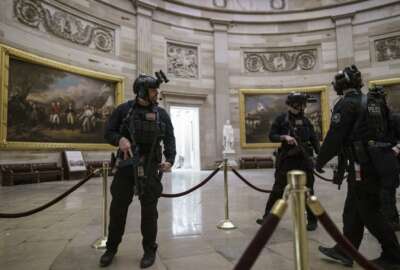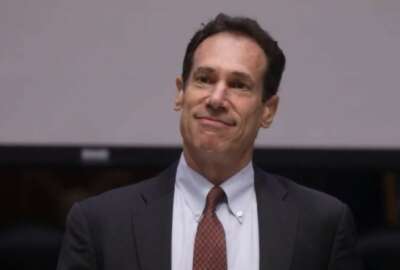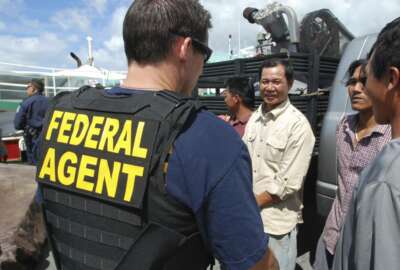
Federal law enforcement reacts to storming of the Capitol building
What did the Capitol Hill Police do or not do? That's the question bubbling up in a Washington already in outrage overdrive. The day-long occupation of the Capitol...
Best listening experience is on Chrome, Firefox or Safari. Subscribe to Federal Drive’s daily audio interviews on Apple Podcasts or PodcastOne.
What did the Capitol Hill Police do or not do? That’s the question bubbling up in a Washington already in outrage overdrive. The day-long occupation of the Capitol did seem to show flaws in planning. For one perspective, Federal Drive with Tom Temin turned to the president of the Federal Law Enforcement Officers Association, Larry Cosme.
Interview transcript:
Tom Temin: Larry, good to have you back.
Larry Cosme: Hey, thanks for having me back.
Tom Temin: I don’t know where to begin here. But the Capitol Hill police are, I guess, coming under fire. First of all, what are you hearing with respect to in the law enforcement community about the Capitol Hill police? Is the sense that they sort of were caught asleep at the switch on this one, or was this one of those black swans that no organization could have been prepared for?
Larry Cosme: I just want to say one thing, first and foremost, the Capitol Hill police officers and the other law enforcement officials that supported the Capitol Police did an outstanding job considering the circumstances that they were dealing with. And they were overcome, obviously, by the amount of people that that broke to the Capitol, which is totally unacceptable. We as defenders of the US Constitution, we respect every American’s right to protest. But the Capitol Police, during those circumstances did an outstanding job. Should it have been handled a little bit different? That’s up to the leadership of Congress, since they don’t fall under the executive branch. And they need to reevaluate that at the leadership level. But the frontline officers did an outstanding job. And those supporting those officers did an outstanding job considering the circumstances. And these individuals should have not attacked the officers. We have plenty of them that are out on injuries right now.
Tom Temin: Yes. And the difference between I guess this issue with the Congress and earlier incidents, there were a couple of officers killed 22 years ago, and someone alone crazed it turned out gunman got inside shot two officers made it into one of the leadership offices, but that was one individual. So as a result, there was the installation of metal detectors and lots of perimeter security at the doors of the Capitol, but not on the perimeter of the Capitol grounds itself. Is that one of the issues? Because never has such a large group in effect surrounded that building.
Larry Cosme: Well, when a situation like this occurs, they need to do what’s called a threat assessment. And this threat assessment needs to start from the top down and the bottom up both, and in every direction. And then give everyone a seat at the table and to reevaluate, what happened? What didn’t happen? What went wrong? Where did it go wrong? What was the operational planning prior to this event? Obviously, they had they had advance notice that this event was going to take place. I’m not privy to the current intelligence on what the threats might have been. But that’s something that needs to be revaluated by the leadership of the Capitol Police.
Tom Temin: Because guarding against, say, the crazed gunman or the individual or even the driver that might try to crash through barricades and so forth, that’s a whole different type of police action, a whole different skill, isn’t it, then holding back a large angry crowd that’s kind of pressing in on you?
Larry Cosme: Yes, that’s that’s more reactionary in a quick reaction, because things evolve in a quick and timely manner, and quicker manner than most most planned events. This was a planned event, which it could be more proactive in bringing other federal agencies and other municipal and state stakeholders that can help out and partner up with them in reinforcing the law enforcement perimeter.
Tom Temin: Because the mayor of DC was saying that they’re not the Capitol Hill police, of course, the Metropolitan Police, but they are available almost like a junior National Guard to the Capitol Hill police if those reinforcements are needed, which they decided, I guess, midday that they were. Are you trying to say that perhaps that call could have been made earlier?
Larry Cosme: And therein lies the problem. We need to take the politics out of policing. And those individuals that are serving our country in elected positions, they should just allow the leadership of departments to do their job, and therefore they can be protected in the right way and giving them the proper budgeting. Because we all always hear this, defund this, defund that. But, you know what, at the end of the day, it’s about the way they want to perceive police officers. Listen, police officers are doing their jobs as defenders of the Constitution, and that’s important. And they did an outstanding job considering the circumstances.
Tom Temin: But this question must come up a lot in many jurisdictions and many domains. You’ve got various federal law enforcement agencies that operate throughout the country, nearby are local law enforcement. Does that question come up regularly? When might the federals need to call in reinforcements from local police? Are there protocols for that kind of thing and kind of known action plans?
Larry Cosme: Yes, there’s always operational plans when there’s big events. The agency that I worked for US Customs, before, I’ve retired now, with US Immigration and Customs Enforcement within the Division of Homeland Security Investigations, you always do an operational plan when you have a big event like this. Whoever the lead agency is, they coordinate the operational plan, they coordinate the meetings, they bring in the outside stakeholders from different entities, whether it’s federal, state, or local law enforcement, and those individuals sit down at the table months prior or whenever they get first noticed that this events taking place.
Tom Temin: So it sounds like there could have been earlier planning. I think you said that earlier, maybe the call could have been made knowing this was going to happen. Although in this case you hadn’t heard maybe the President’s speech, maybe hadn’t heard that type of encouragement, incitement, whatever you want to call it. Maybe they couldn’t have known this would quite end up the way it did.
Larry Cosme: I think what the President should have done is come out early on and said, wait a minute, folks, we condemn violent attacks against law enforcement and those individuals that trespass against federal properties. And that’s something that should have been a strong message to all these individuals. And they should have been told, this is totally unacceptable. We’re a law and order country, we totally do not accept this. And we at FLEOA condemn this type of violence against federal law enforcement or state and local law enforcement officers.
Tom Temin: And what about there were some pictures, selfies and so forth of officers, in some manner, lighting cigarettes or encouraging people to put out cigarettes or posing with selfies. Were there’s some breakdowns in protocols of policing that might have happened from what we can see, at least on the footage?
Larry Cosme: I’m not going to comment specifically to that information. But I can tell you in a general sense, when there’s big rallies like this where individuals are peaceful protesters, most of the interaction between the law enforcement officers and the citizens that have a right to protest is pretty cordial. I mean, someone might ask someone for a light or someone might ask them for anything, it could be anything, it could be a tissue, a napkin if they’re eating something, it depends on the circumstances, but it’s not uncommon for them to interact like that. But this specific situation, I’m not totally aware of that whole incident.
Tom Temin: Because I got the sense again, just looking at the footage, I wasn’t there, when some of those people did get into the Capitol, maybe not the ones that broke the windows, but the ones that crawled in afterwards, when they were in there, they almost didn’t know what to do next. We saw all sorts of results in people sitting in this chair, and that chair, and so on. And there was some damage done, but I got the sense that once in people were mostly kind of touring and walking around almost surprised that they got themselves inside that building. What’s a good response to that type of situation?
Larry Cosme: Like, like I said, the Constitution is clearly there for all Americans. So they had the ability to protest to scream and shout, but as long as they keep their hands to themselves, and they don’t break into federal property, or anyone’s property, they have every right to walk in peacefully, and if they want to scream and shout, obviously, they’ll be told according to the protocols of Capitol Hill, what they can do and can’t do. But they have that right, that fundamental right. But for these individuals that attacked these officers, that’s totally unacceptable. They created a chaotic situation and a major threat to our country.
Tom Temin: What I’m trying to say your drive out is that some people were violent, were attacking officers and property, some were just merely trespassing.
Larry Cosme: Yes, multiple individuals had been charged, over 53 individuals have been charged. And that’s where in essence, all this type of rallying, once it goes beyond their first amendment rights and they start committing crimes, not just even this specific rally, any rally, individuals that turn into violent crime, they should be charged with the highest levels of federal law or state and local law that are applicable to these individuals for committing these crimes.
Tom Temin: And from the standpoint of law enforcement, what should they be evaluating at this point?
Larry Cosme: They need to be doing a full threat assessment both on the interior barriers, exterior barriers, the amount of personnel, the proper equipment that they should have been wearing. I understand sometimes now they want to have a touchy feely situation with with law enforcement because the light has been shed on all law enforcement, even prior to this incident. But at the end of the day, law enforcement are protecting, whether your federal, state or local, they’re protecting the citizens of this country that are law abiding citizens period.
Tom Temin: Larry Cosme is president of the Federal Law Enforcement Officers Association. Thanks so much.
Larry Cosme: Thank you for having me back on, thanks.
Copyright © 2025 Federal News Network. All rights reserved. This website is not intended for users located within the European Economic Area.
Tom Temin is host of the Federal Drive and has been providing insight on federal technology and management issues for more than 30 years.
Follow @tteminWFED
Related Stories





